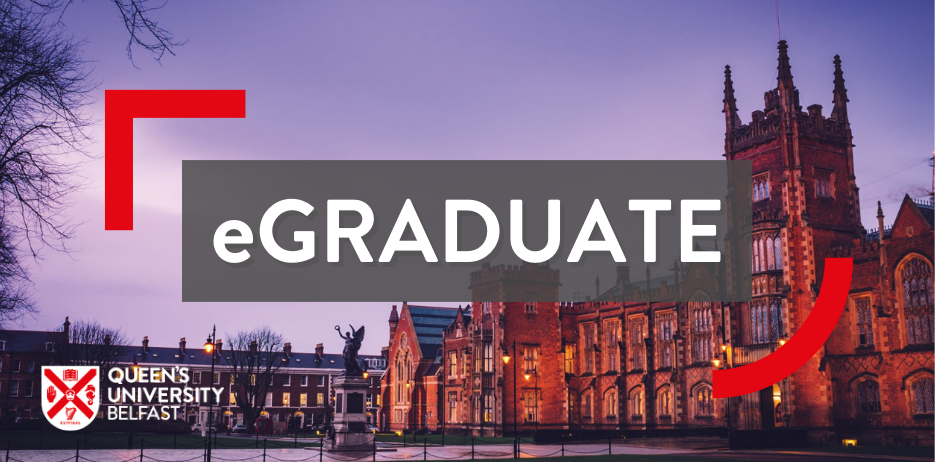
Two exceptional Queen’s graduates – Cormac McAnallen and Brian Conlon – both played and loved GAA football. They are, sadly, no longer with us. But thanks to the scholarship and prestigious award that bear their names, their passion lives on in the next generation.
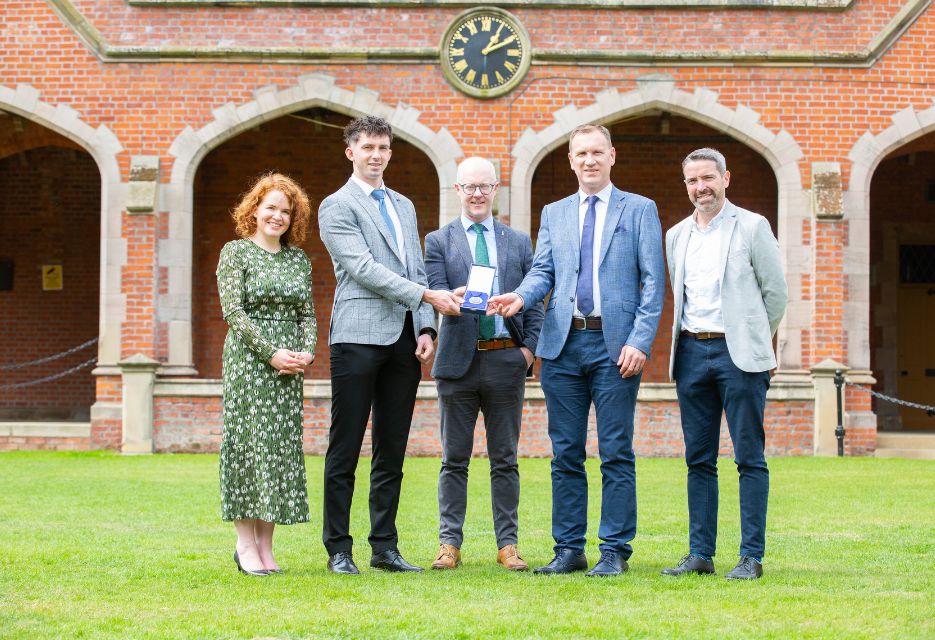
Naoimh Wilson, Development Officer, Cormac McAnallen Medal 2023 recipient Tiernan Bogue; Jack Devaney Chairman, Queen’s Gaelic Football; Donal McAnallen; Karl Oakes, Head of Sport.
Cormac McAnallen (Modern History, 2000) was an incredibly talented sportsman. He played at Queen’s for four years, winning a Ryan Cup in 1999 and a Sigerson Cup medal in 2000. He added an Ulster and All-Ireland double with Tyrone in 2003, plus a GAA Allstar. But in March 2004, Cormac died of a heart condition, aged just 24. After his tragic death, Queen’s honoured him as Graduate of the Year 2004 – the first time the Award had been made posthumously.
Since 2012, the Cormac McAnallen Medal, initiated by the Queen’s University’s GAA Club and Past Members’ Union in his honour, has been awarded intermittently to a player who has made an exceptional contribution to the Queen’s GAA Club. This year, Tiernan Bogue (Medicine, 2023) is the worthy winner. He is the current Queen’s Sigerson Captain, whose home club is Tempo Maguires GAC, and he plays senior county football with Fermanagh. Bogue recently completed his medical studies and will shortly take up a post as a doctor in the South West Acute Hospital.
Connor Deegan, Queen’s Sigerson Manager, says Bogue has been an exceptional leader for Queen’s Gaelic Footballers, and that his commitment to the sport is exemplary. “I know that this award is highly prized and is presented only to those who are held in the highest esteem by the club. I can think of no more fitting recipient than Tiernan and I know he lives up to the high ideals that Cormac McAnallen held dear.”
Those high ideals would have been familiar to Brian Conlon (BSc Accounting 1987, DSc (Econ) 2012). The founder and CEO of First Derivatives, one of NI’s most successful technology companies, Conlon was also an accomplished GAA footballer. He played for his native Down in the 1980s until a serious knee injury – sustained during a Sigerson Cup match for Queen’s in 1987 – ended his playing career.
Sadly, Brian died in July 2019 aged 53, after a short battle with cancer. In April 2022, his family established The Brian Conlon Foundation to celebrate his life, promote his passions and continue his legacy.
GAA football, of course, was one of those passions. In 2022, the Brian Conlon GAA Scholarship was established within the Queen’s GAA Academy thanks to a generous gift from The Brian Conlon Foundation. The award is presented to an outstanding student who has come through the Gaelic Football Future Stars programme, and is based on their engagement, attitude and performance during their first year at Queen’s.
This year’s recipient is Diarmaid King (Business Management, First Year), a Queen’s Freshers Footballer whose home club is Newtownbutler First Fermanaghs GAC. Diarmaid was awarded a Gaelic Football Future Star while attending St. Michael’s College in Enniskillen in 2020. He continued to develop as an outstanding player for Queen’s Freshers, and is currently part of the Fermanagh senior county squad.
“Diarmaid is an exceptional talent and I have no doubt he will continue to progress and become an important player on the inter-county scene,” says Niall Jackman, Queen’s Freshers Football Manager.
The future of GAA sports at Queen’s is bright – thanks to Queen’s players past, present and future.
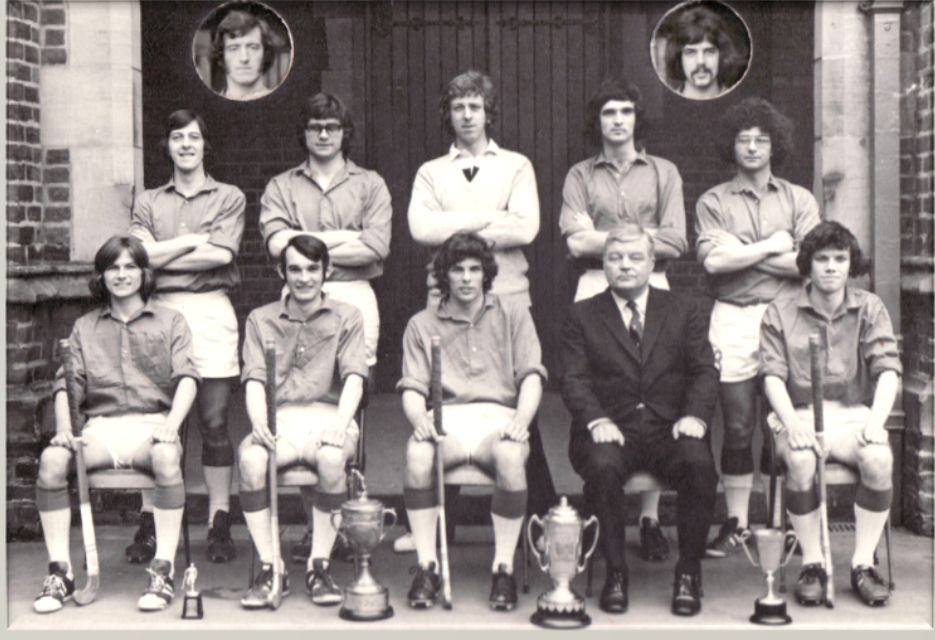
Men's Hockey Club (1971-72) Winners of the Irish Senior Cup, Ulster Senior Cup and Mauritius Cup. Back row (L-R): P. Marshall, J. McDonough, R. Finlay, N. Crawford, S. Sweeney
Front row (L-R): P. Anderson, J. Clarke, T Gregg (Captain), B. Crymble (President), N. Dunlop
Inset: N. Quinn and N. Menary
On 19 September 1898, the Ulster Branch Hockey Club admitted the Queen’s College Hockey Club into their membership. It marked the beginning of more than a century of enthusiasm and excellence in hockey at Queen’s.
In fact, hockey at Queen’s is now celebrating its 125th anniversary. And while some things haven’t changed – the club’s traditions of fair play, great sportsmanship and a welcome for all, for example – those early pioneers would no doubt be amazed and thrilled at how successful hockey at Queen’s has become.
“Right now, we have five women’s teams and two men’s teams, one social mixed team and one social female team. We’re one of the largest clubs at the University, with around 250 active members,” says Chloe McAnulty, the University’s first full-time Hockey Development Officer.
Queen’s hockey teams have had success in abundance right from the start. After lifting the Irish Senior Cup for the first time in 1912, the Men’s Club won it for the third time in 1981, captained by Peter McCabe (Biology, 1981) – whose son, Scott McCabe (Business Management, 2021) is the current Men’s 1st XI Captain. (That team recently won the Ulster Premier League trophy for the 2022/23 season.)
The women’s teams have also gone from strength to strength since Simon Bell took over as Women’s Head Coach in 2007, says McAnulty. “The 1st XI squad were promoted into the Ulster Premier League in 2010, where they have remained ever since. Both performance squads have won Premier League titles in recent years – the Women’s Club in 2019 and the Men’s Club in 2023. And we will continue to drive for success across all our performance, development and participation teams.”
In 2014, the Hockey Academy was created, to help support young, talented athletes through its Elite Athlete Programme and Hockey Academy scholarships. The club now has access to world-class facilities, including two new artificial water-based and sand-dressed pitches. In the future, they hope to play more fixtures internationally.
But you don’t have to be an elite player to join, says McAnulty. “Whether you’re a beginner or you want to play internationally, we strive to cater for everyone. We really pride ourselves on that, and welcoming players of all levels is very important to us. Take our four-week social hockey programme, for example, which features mixed-ability teams that help everyone get to know each other. You get the chance to play with and meet performance athletes, and learn from each other, both on and off the pitch.”
The power of sport to bring people together came home to McAnulty, she says, at the recent anniversary black tie dinner, where Bell was presented with the Lifetime Achievement Award. “I met two former club members who had played together but hadn’t seen each other for 55 years – and they emailed me the next day to say how brilliant it was to reconnect. At one point, I took a step back to just take in the atmosphere and all I could hear were roars of laughter from our members, ranging in age from 18 to 80. Playing sport is so important: it’s where you meet your friends for life.”
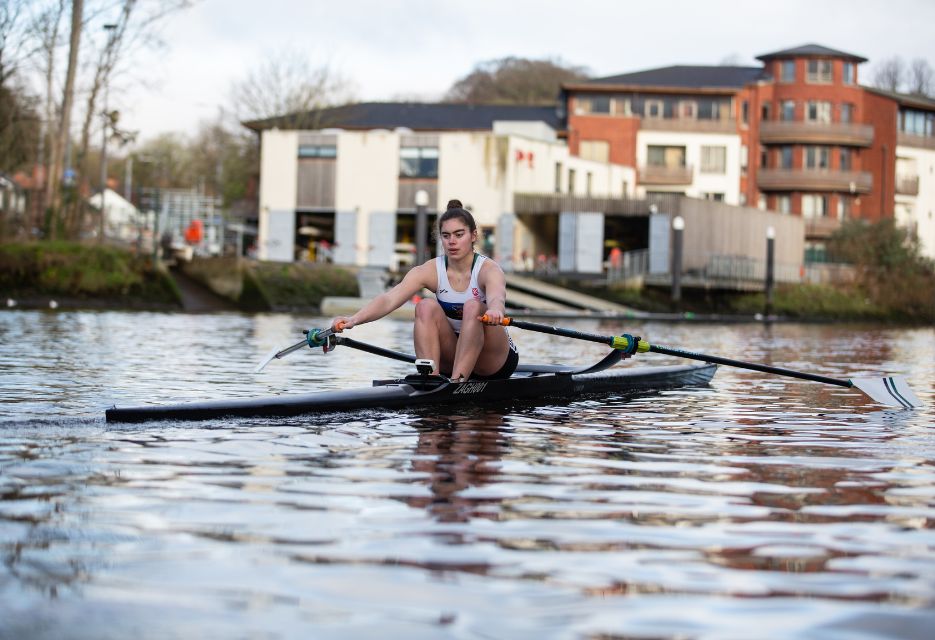
Molly Curry (Denistry, Third Year)
Nobody gets to the winner’s podium alone. Behind every successful athlete, you’ll find a host of people providing support, from finance to wellbeing. And rower Molly Curry is determined to make the most of every helping hand.
When Curry (Dentistry, Third Year) came to Queen’s from Coleraine Grammar School, she was already a junior international rower, coming fifth in the double scull at the 2019 Junior World Championships and fifth in the quad at the 2020 European Junior Championships. She wanted to go to the next level, but was concerned about juggling her demanding degree with the intense training that’s essential to get there.
“Luckily, I was put on the Elite Athlete programme, so I get a lot of support through that,” says Curry. “Along with world-class facilities and help with health and wellbeing – such as nutrition – I also get academic flexibility. That means I can cope if I go away to compete or train. It takes a bit of time management, but once you’re in the routine, it’s fine.”
Competing at this level is expensive: athletes must find the money to travel to competitions and training. Queen’s has received support from the Livanos Trust, which has generously given £10,000 to support the university’s women rowers. “The money is enabling us to buy four sets of new sculling blades and four new sweep blades,” says Curry. “That means even more rowers can be involved and go out on the water.” It has also enabled Curry to travel to two sets of GB rowing trials. “I’m incredibly grateful for it.”
Her dedication is paying off. In 2022, she won national championships in the single scull and double scull, and represented Great Britain at the European Athletics U23 Championships in the quad. Is she heading for the Olympics? “Right now, I’m taking training one day at a time,” she says. “I’ll just see where it takes me and hopefully keep improving. But yes, I’d love to get to the Olympics one day!”
Whatever happens, she says she’ll keep rowing – and keep encouraging others to do the same. “Everyone should give rowing a go because it’s such a great feeling being out on the water and in the fresh air. You meet lots of people and make friends for life. They see you in your happiest and your saddest moments. You encourage each other and support each other every day. It’s a great community to be part of.”
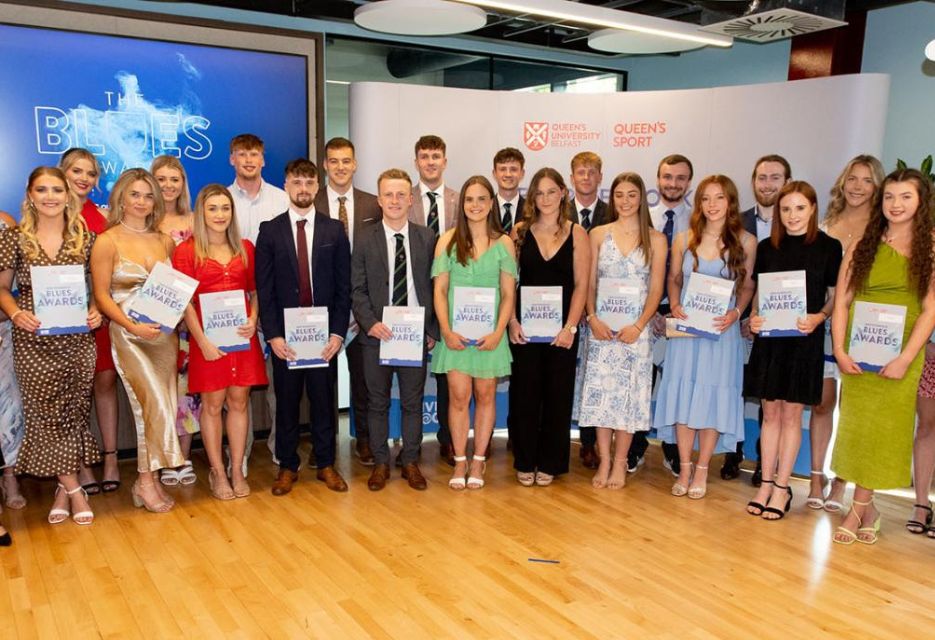
Award Winners - 2023 Deep RiverRock Blues Awards
For 70 years, the Blues Awards have recognised and honoured the highest sporting achievers at Queen’s. This year, they also celebrated both the joy and togetherness that sport in the community brings – and the rich heritage of sport at Queen’s.
The 2023 Awards were held at the Whitla Hall on 8 June and were sponsored by Deep RiverRock. "It was a special evening, as always," says Karl Oakes, Head of Queen’s Sport and Physical Wellbeing. “These awards are steeped in history – and they are the only formal recognition tool we have for sport and achievement.”
The system for nominating athletes for Blues has not changed since the 1950s: each eligible club nominates those who have achieved great things, such as competing at a national or international level. Along with the Blues, four special awards have traditionally been given: Coach of the Year; Individual Achievement; Team of the Year; and the Hidden Hero Award, which recognises a student who has gone above and beyond in their contribution to a sports club.
But this year, for the first time, two more awards were introduced. The Inspirational Sporting Award, in association with Queen’s University Widening Participation, celebrates those sporting achievers who came to Queen’s through the Widening Participation programme. This year’s winner was Kaylem McShane (Computer Science, Third Year) for his contribution to basketball.
And the Community Impact Award, in association with VANRATH, was won by Queen’s Parkrun, which for the past ten years has welcomed runners of all abilities to run 5k at any speed they like. “Around 250 community groups use our facilities over the course of a year, and we decided to pinpoint those users who are going way beyond in terms of contribution to community and civic society,” says Oakes.
The Blues themselves cover an incredible range of activities from the 55 sporting clubs currently active at Queen’s. The ceremony, hosted by BBC Sport journalist Thomas Niblock, saw winners from sports as diverse as canoe polo, surfing and cycling, along with the Big Five: football, hockey, rowing, GAA sports and rugby.
Along with celebrating the sporting heroes of today, this year’s Blues were the first to introduce the Queen’s University Sporting Hall of Fame. The Hall honours and celebrates the most distinguished sportsmen and women among Queen’s graduates in each decade, from Irish rugby great Jack Kyle (Medicine, 1951), representing the 1950s, right up to Caroline O’Hanlon (Medicine, 2016) for her contribution to netball and Ladies’ Gaelic football in the 2010s. The Hall of Fame will now be an integral part of the annual Blues Awards.
“The Blues are always a wonderful evening for everyone who attends,” says Oakes. “But they also demonstrate the impact and value of sport at university in terms of the student experience. They show the overall transformational element of clubs, sports and general physical wellbeing. And they show that the university experience is not just about academics. Our students are also here to develop their soft skills and grow as people. Sport is a wonderful way to do that.”
Top of Page